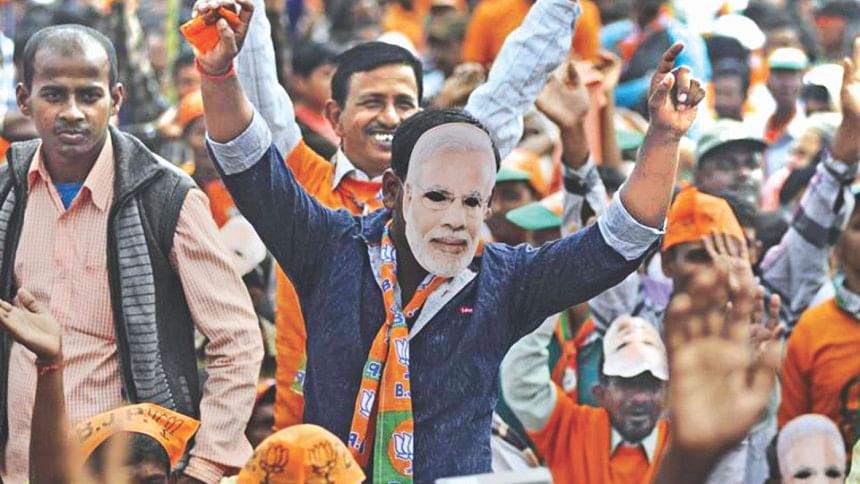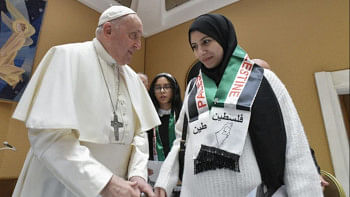Saffron sunrise on India's northeast

Five years is a long time in electoral politics. From zero to zenith—that is how Prime Minister Narendra Modi described BJP's rise to power in Tripura assembly elections. What he was pointing to is statistics. In the previous assembly elections in 2013 in the state, BJP had failed to get a single seat but this time it won an emphatic majority on its own in a state where its organisational growth comprised largely of imports from other parties like Congress, Trinamool Congress and CPI(M).
But figures only partly explain BJP's victory in Tripura behind which lies a combination of anti-incumbency, a few carefully crafted strategic alliances with regional parties, meticulously planned and sustained high-level engagement with the northeast and a quiet network of social services assiduously built up by BJP's spiritual fountainhead, Rashtriya Swayamsevak Sangh in the region.
BJP's remarkable performance in Tripura has come as a surprise to many as the party had secured less than two percent votes in the 2013 assembly elections. This time, it surged to just a little over 50 percent. The Left has lost seven percent of its nearly 50 percent vote share in the state in 2013 while Congress's vote share nosedived from 36.5 percent in 2013 to a paltry 1.9 percent in 2018. Tapping into growing anger against Left rule, especially of the aspirational youth, and taking advantage of a moribund Congress in the state, BJP took away seven percent loss of the Left and the massive deficit of Congress to emerge triumphant.
Ever since Prime Minister Narendra Modi assumed power in May 2014, northeastern India has received developmental focus never seen before. The federal government's push for massive infrastructural development, especially rail and road connectivity in the northeast, has been unprecedented. Hardly a week passed without a federal minister visiting one or two of the seven northeastern states in the last four years. These were the toppings of RSS and its affiliate outfits' social welfare programmes in the northeast quietly catering to the local population in educational and healthcare sectors in remote and impoverished areas of the region.
It was not easy for the RSS to do so given the fact that Meghalaya and Nagaland states in the northeast are dominated by Christians and that churches in the two states had asked its adherents not to vote for BJP. Critics of RSS and BJP tried to paint them as solely Hindu outfits which would impose certain food choices on non-Hindu people. So, keeping in mind local sensitivities in Nagaland and Meghalaya, BJP and RSS had to undertake a nuanced shift from its known stand advocated in other parts of the country (a complete ban on cow slaughter and consumption of beef).
The main aim of RSS's social service initiatives was to counter the fear spread by churches, earn the confidence of the local people and break their mindset about RSS while ensuring that they are not coerced or induced into converting their religion. In doing so, RSS was doing the spadework for BJP's expansion in the northeast.
RSS's role was evident from the presence of Sunil Deodhar, its pointsman in Tripura. He, in coordination with BJP general secretary Ram Madhav and the party's leader from adjacent Assam Himanta Biswa Sarma, was overseeing every move in the state and drew up a meticulous plan. Deodhar was the campaign manager of Modi in his parliamentary election from Varanasi constituency in 2014.
Poverty and lack of developmental work in the northeastern region became the focal point for RSS's work and the Modi government. The RSS reached out to various tribes through its network of affiliates such as the Vanvasi Kalyan Ashram, running schools and healthcare centres for the poor in remote areas who have remained largely untouched by development. The standing instruction from Modi to his ministerial colleagues was to visit northeastern states frequently and take special care of the developmental projects of the federal government tailor-made for the people. What RSS activists on the ground did was closely monitor the works of the organisation there.
Northeast India suffers from severe unemployment and lack of educational opportunities which forced many youth from the region to migrate to other parts of India in search of jobs. The Modi government held out the promise of special economic zones for bamboo, textiles and food processing and BJP promised to set up an autonomous state council which would have access to funds directly from the federal government given the poor track record of authorities in the states to plan and execute developmental projects.
While Modi made development his primary focus in the elections in Tripura, Nagaland and Meghalaya, Deodhar's task was to tap into the electorate's desire for change and turn it in favour of BJP by pointing out how government employees in the rest of India were getting higher salaries under the 7th Pay Commission while employees of Tripura government were still stuck under the 4th Pay Commission. The Left was stuck in a time warp and ignored the aspirations of the restive young voters. For instance, Tripura became the internet gateway of India with the help of Bangladesh's extensive high-speed network facility in 2015 but not a single information technology project was set up in the state.
BJP's strategy of joining hands with the small parties/groups in the areas where it is weak worked. In Tripura, the party collaborated with Indigenous People's Front of Tripura which has considerable support among indigenous people who constitute about 30 percent of the state's population. In Nagaland, BJP took the strategic decision of contesting the recent elections in tie-up with the Nationalist Democratic Progressive Party (NDPP). This even as BJP was a constituent of the current government with Naga People's Front (NPF), NDPP's political rival. BJP wanted to minimise anti-incumbency by aligning with NDPP and at the same time keep the option open of working with whoever emerges as the highest seat-getter in the polls.
Pallab Bhattacharya is a special correspondent to The Daily Star.





Comments